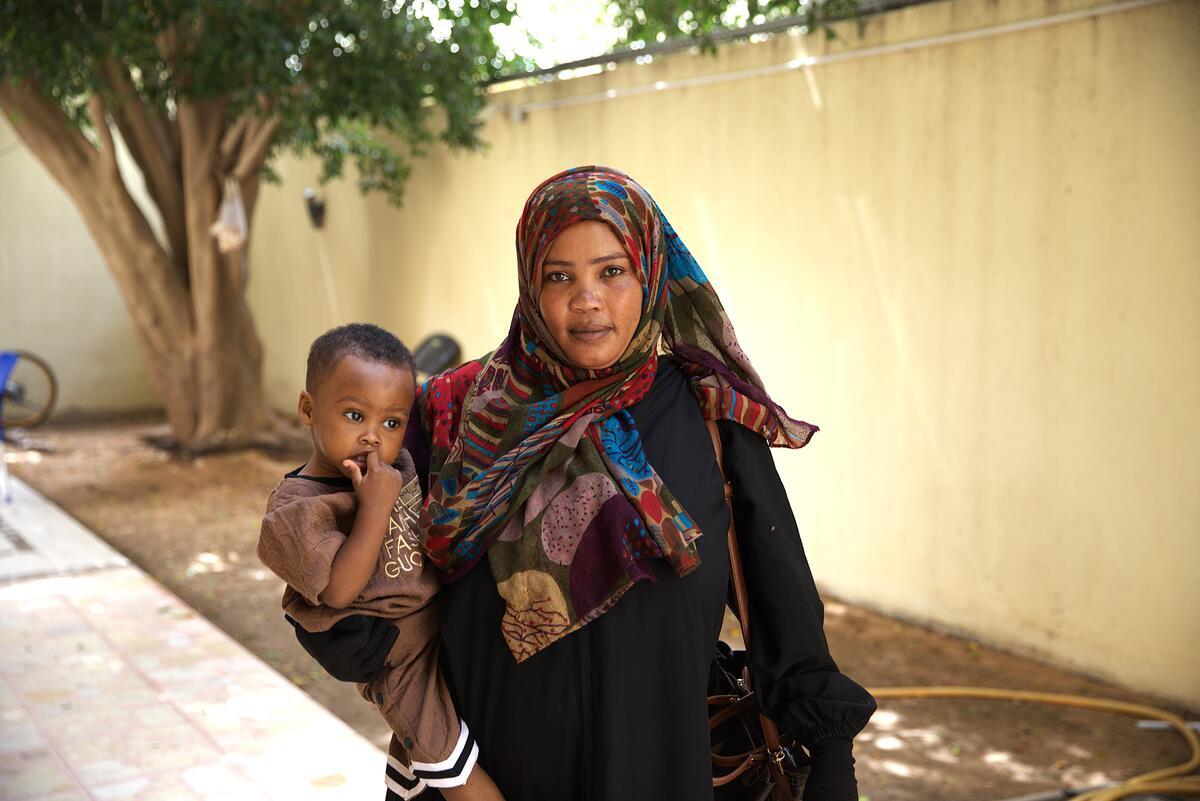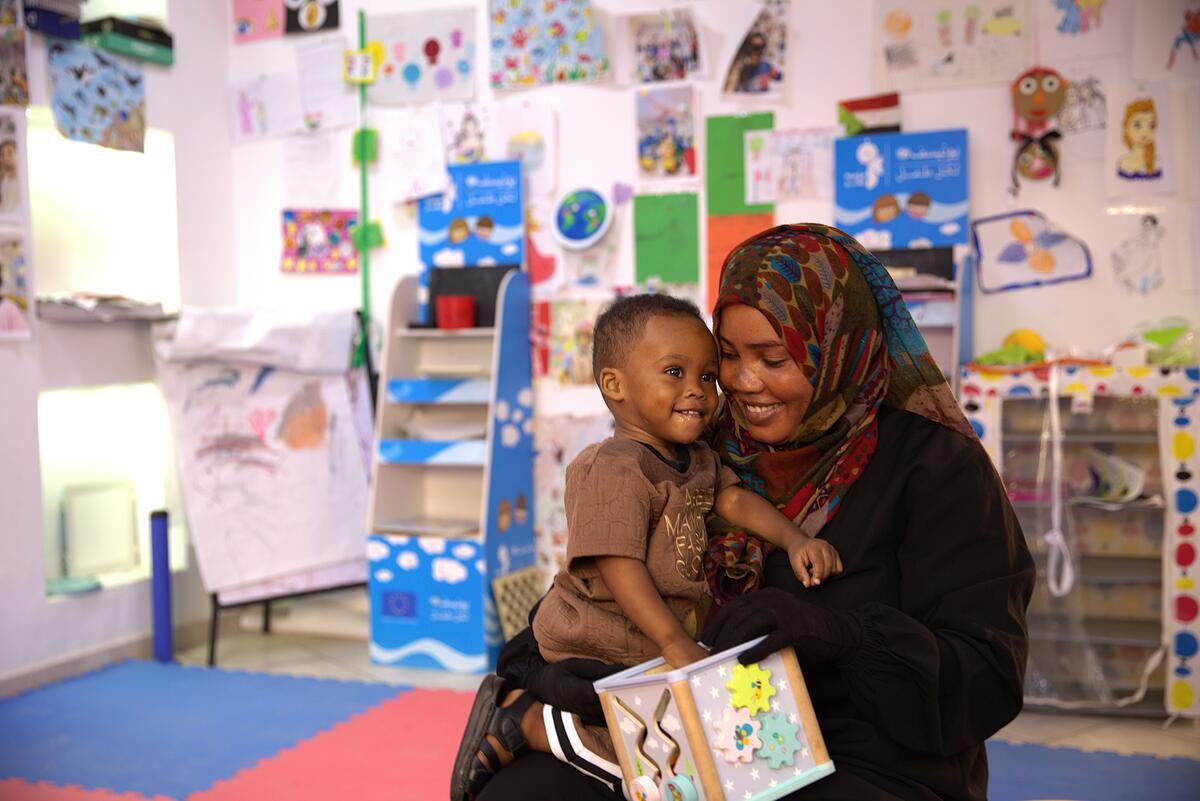Sudanese mother suffers tragedy before perilous escape to Libya
Sudanese mother suffers tragedy before perilous escape to Libya

Tahani Hamid and her son, Emad, fled to Libya after the conflict in Sudan took a tragic toll on their family.
Tahani Hamid, 35, remembers her former life as a housewife in Sudan’s Darfur region as peaceful and happy, caring for her three young children and preparing meals for them and her husband, a local policeman. But as rivalry between two Sudanese military factions erupted into full-blown conflict in April last year, a series of calamities shattered that tranquil life, changing it forever.
In the weeks before the start of the conflict, armed skirmishes broke out in their neighbourhood in Neyala and a stray bullet pierced the metal roof of their mud-brick house, hitting Hamid just above the left elbow. She was rushed to hospital and underwent surgery on the wound. Thinking the worst was over, the family returned home, but any optimism proved tragically misplaced.
In July, armed militia fighters entered their home to detain Hamid’s husband. When Hamid tried to defend him, she was struck with the butt of an automatic rifle, leaving her with serious injuries. Her husband was tied up and taken away and Hamid has not seen him since. She is unsure if he is even alive.
A month later in August, the unthinkable happened. While Hamid was shopping at the local market, an explosion ripped through the morning air. Minutes later a neighbour rushed towards her and said her house had been hit. Her twin daughters and their grandmother who had been looking after them had all been killed. She collapsed, waking up the next day in hospital with the realization that her worst nightmare had become reality.
Despite her grief, Hamid still had her 18-month-old son Emad to protect. She decided to flee to Libya with him and a cousin. Libya has a historic connection to Sudan and prior to the start of the conflict was home to over 130,000 SudaneseLink is external. Nevertheless, the long journey through the desert would be fraught with danger. “I had no choice,” said Hamid. “I was too scared that they would come after me too.”
Perilous journey
After paying a hefty fee for transport to Alkufra, the first major town across the border in Libya, a puncture on the way – ordinarily a minor inconvenience – nearly cost the mother and son their lives. Leaving the pick-up truck and his passengers stranded in the middle of the desert, the driver took another vehicle back across the border to Sudan to find a spare tyre.
“It took him three full days to get back to us. By the time he returned, we had already finished our water and food,” Hamid said. “We were in a really, really bad situation. Many fainted because we hadn’t been able to drink. In that moment I thought, me too, I will die here.”
The journey from Sudan to Libya is well known for its dangers. Pick-up trucks make the three-day passage through the remote desert, often in ferocious heat with passengers piled into the rear. Corpses along the route are a stark reminder that any who fall out are left behind.
“Despite it all, this journey was better than staying in Sudan,” Hamid stressed.
- See also: Death in the DesertLink is external
Nearly 100,000 Sudanese refugees have reached Libya since the start of the war, according to estimates by UNHCR, the UN Refugee Agency. The majority have taken the same route as Hamid to Alkufra from the Darfur region or the capital, Khartoum.
A precarious safety
After arriving in Alkufra, Hamid and her cousin secured money for the onward journey to Tripoli. Homeless for several weeks upon arrival, they were taken in by a Sudanese family who had lived in the capital for over 20 years.
“They helped me find a job, a home, and put food on the table,” Hamid said. Just as she was finally getting back on her feet, Emad fell sick and had to be hospitalized. While his treatment was free of charge, Hamid did not have the means to pay for his medication.

Hamid received emergency cash assistance from UNHCR which helped her repay a debt to the Sudanese family hosting her and her son in Tripoli.
The family advanced her the money, but they too were struggling financially. She promised to repay her debt despite not knowing where she would find the money. Financial support provided by UNHCR eventually enabled her to pay them back. UNHCR provides emergency cash assistance to some of the most vulnerable refugees in Libya.
Hamid saved the rest of the cash to help pay rent for the apartment she now shares with two other refugee families. Like many refugees in Libya, she eventually hopes to find a safer place to call home. UNHCR is working to provide refugees with long-term solutions such as resettlement, family reunification or evacuations from Libya. So far this year, 650 refugees have departed the country through such avenues but with 65,000 registered refugees, the needs far outweigh the opportunities.
While Hamid has managed to escape Sudan and reach relative safety, she will carry the physical and psychological scars of the conflict for the rest of her life. Her only dream now is to protect her son – the only member of her family she has left – and give him the chance of a better future.
“I am just looking for a safe place; it doesn’t matter where.”








